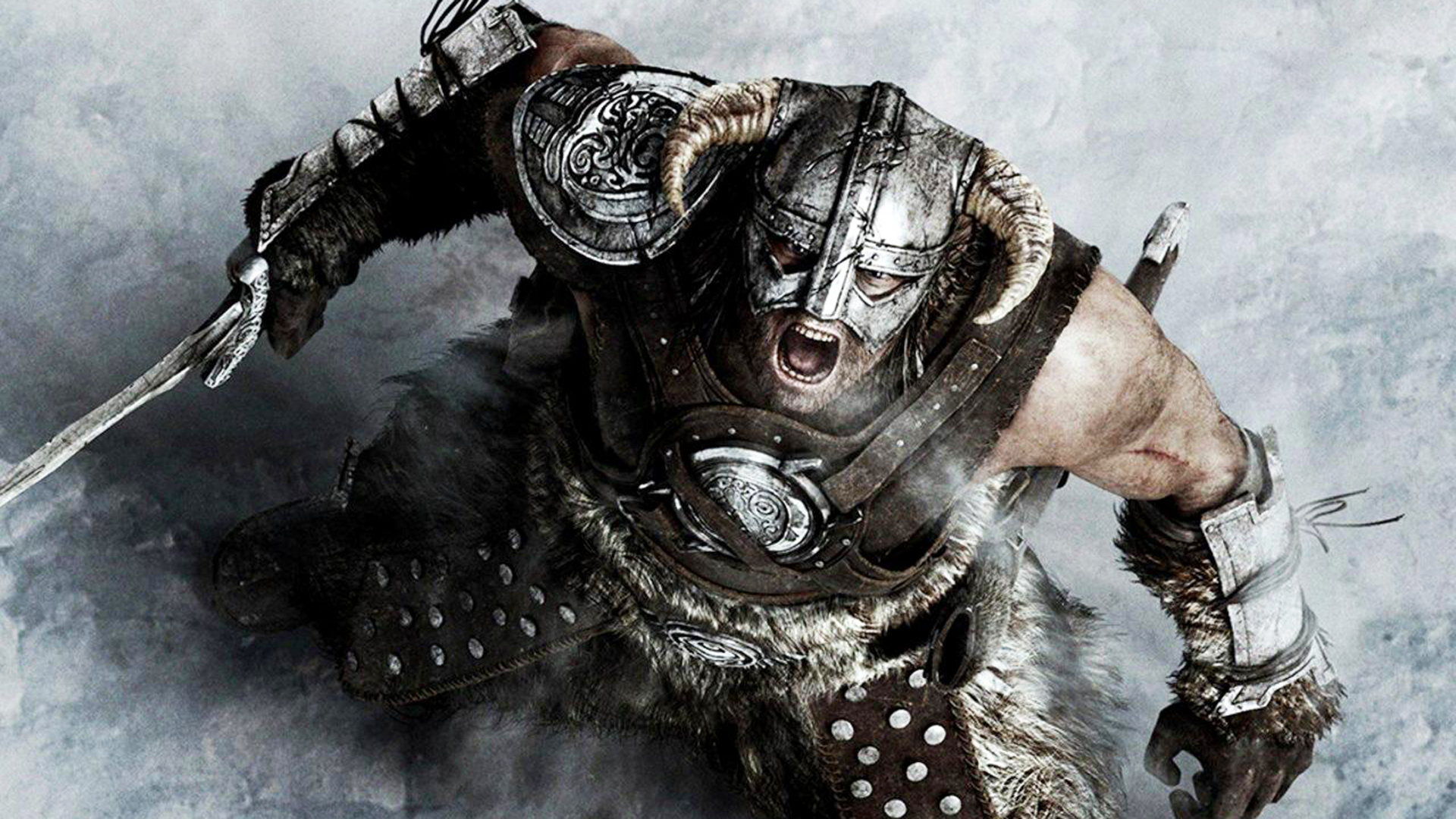
Killer beats to dungeon crawl to.
After a decade-plus of metal fandom, I’ve found it harder and harder to find bands that truly stick with me. As a teen, the sheer sonic brutality of Slayer’s Reign in Blood or Death’s Leprosy gripped me like nothing else.
Now, I spend countless hours scouring Bandcamp’s depths, trying to recreate my early experience with metal. Recently, I’ve discovered some genuinely baffling genre tags: melodic grindcore, psychedelic nu-metal, pro-Keynesian-economics black metal and something called… Elder Scrolls metal?
My eyes lit up like a Skooma-fiend. My obsession with metal started around the same time as my passion for the world of Elder Scrolls. I was wrong to think that unrelenting force was the only appealing trait of metal. The discovery of increasingly niche subgenres had always been a crucial part of my love of the genre.
Still staring at the words “Elder Scrolls metal” I pledged my allegiance to the Night Mother and took the plunge. Deep within her fertile grave, I discovered the dank sludge of Wuuthrad, and the gritty power of Daedric Chamber, amongst other Elder Scrolls-themed bands. The Bards College best beware because we’re going electric—these are the metal bands that Elder Scrolls inspired.
Battle Born
Subgenre: Power metal
Claiming to hail from the snow-swept streets of Windhelm, Battle Born is a power metal band that writes “powerful hymns of war” to aid in the defense of their city against the “Imperial scourge”. The pageantry in their artist bio is a mere hint towards the theatricality found in the single “Bring the Metal Back” from their self-titled EP.
The story of the song is a tale older than time: Life in Windhelm revolves around Beer and Metal until the arrival of the Septim Empire threatens this noble way of life, and the people of Skyrim must go to war. Though Skyrim is the setting for this riff-based call-to-arms, in true power metal fashion, the song is about heavy metal above all else. Seriously, get a load of these pre-chorus lyrics: “Metal magic / It has the power to heal / Your wooden swords are broken / ‘Cause metal’s made of steel.”
While there’s an AC/DC-like joy in listening to a song about the genre you’re currently listening to, I don’t find this approach to be very satisfying when it comes to Elder Scrolls-inspired metal. If it’s going to be mindless, please just give me lyrics about a giant who crushes Imperial scum with kegs of Honningbrew mead.
Tamriel
Subgenre: Deathcore, technical death metal
Lyrically, Tamriel’s Blood and Ebony EP does an exceptional job of placing the listener within, well… Tamriel. “Skewered by Arrows, Pinned by Oak” imagines a Dark Brotherhood assassin’s thwarted assassination attempt in Solitude, while “The Eyes of the Falmer” revels in the grisly details of the Falmer’s enslavement at the hands of the Dwemer.
As for the instrumentals, Tamriel’s deathcore-influenced brand of death metal certainly feels inspired, but the overly mechanical chug of the rhythm section and the digitally compressed guitar leads lend themselves more to dystopian science fiction than high fantasy. Complaints aside, I could imagine myself getting eviscerated by an unrelenting swarm of dwarven spiders to the tune of “Built by Dwemer.” It’s also worth mentioning that this 2012 release is the earliest piece of Elder-Scrolls-inspired metal I could find, so it deserves props for anticipating a minor movement.
Sheogorath
Subgenre: Melodic black metal
Sheogorath, a “video games metal band” from Vienna, Austria makes this list for being one of the few Elder Scrolls-inspired bands that focuses more on Oblivion than it does Skyrim, right down to being named after the Daedric Prince of Madness himself. While the bucolic splendor of rural Cyrodiil doesn’t exactly conjure the imagery of war, death, and decay so prevalent in the genre, the fiery hellscapes that are the Planes of Oblivion sure do.
Sheogorath’s 2021 release, Lunacy Gone Astray, contains a few Oblivion-inspired songs. The title track imagines a figure, likely Sheogorath, who surrenders to the imaginary voices and cryptic visions that plague him. The actual sound of this song, an expertly performed but somewhat generic blackened speed metal outing, does not totally suit the lyrical content, save for the very hypnotic and dreamlike lead guitar.
“Towards Oblivion” fares a little better on the sonic front. The band’s choice to alternate between punishing black metal riffage in the verses and a triumphant and soaring melody in the chorus compliments this song’s story of an army valiantly storming an Oblivion Gate.
Wuuthrad
(Image credit: Wuuthrad)
Subgenre: Doom metal, death metal
I struggle with a band like Battle Born using Tamriel as a setting for songs about the glorious struggle of war because nothing about playing Elders Scrolls games reflects the sentiment evoked in these battle hymns. Sure, Elder Scrolls lore details many battles ranging from the Merethic Era to the Fourth Era, but most of the player’s experience cycles between talking to the local townsfolk, experiencing the tranquil landscapes, and trudging through countless randomly generated dungeons.
It’s this dungeon-crawling aspect of Elder Scrolls that Italy’s Wuuthrad takes to heart; their death-doom musings on Prophecies of the Elder Scrolls are so laden with reverb that they sound like they were recorded in the musty halls of Darklight Tower. The gargantuan and sludged-out riffs plod along at a slow but purposeful pace, not unlike a war-hammer-favoring Orc trudging their way through a maddening series of lookalike corridors while caving in the skulls of Draugrs with steadfast resolve.
Ysgramor
Subgenre: Melodic death metal
The German band, Ysgramor (not to be confused with the Canadian band, Ysgramor) takes the Amon Amarth approach to death metal, choosing to write lyrics about the brutality of war instead of serial killers reducing their victims to gore, or a weird man made out of gore, or gore that comes from space (the scariest kind of gore).
“Windcaller”, their only song to date, imagines the fall of the founder of the Greybeards, Jurgen Windcaller, who has his Thu’um removed by the Nine Divines for suffering defeat at the hands of the Dwemer army. The loss of Windcaller’s Thu’um is emotionally rich territory for songwriting, as the entire purpose of the Greybeards’ order is to cultivate the Thu’um—a form of magic which uses the Dragon Language to expel an exceedingly powerful Dragon Shout. What I admire about this track is how it incorporates both Windcaller’s Thu’um and his legendary status into the music itself.
The song begins with the chorus, which is essentially a couple of Dragon Shouts, delivered with the exact intonation one would expect from Skyrim’s Dragonborn and the Greybeards. After the Windcaller succumbs to psychological decay, the track transitions from metal into a somber epic sung by a choir and accompanied by acoustic guitar, suggesting that the near-ancient legend of Jurgen Windcaller has been passed down to the modern-day bards of Skyrim.
Daedric Chamber
(Image credit: Daedric Chamber)
Subgenre: Black metal
Those who have spent too much time on Bandcamp searching for the grimmest second-wave/raw black metal known to man know that for every gem there are about twenty black metal bands that are so unlistenable they feel like a parody of the famous lo-fi subgenre. Well, I am pleased to report that the experience of searching for Elder Scrolls-inspired raw black metal is exactly the same.
Tennessee’s Daedric Chamber is the reward for my efforts, a prolific one-man black metal project that has put out three full lengths, three EPs, and a split in just over a year’s time. The project’s January 2023 release, a conceptual EP called Dragon Cult Rising takes inspiration not just from the titular collective of Dragon Priests, but from the music of the Elder Scrolls series.
The central melody of “Akatosh Arise” feels directly inspired by the majestic, yet subdued, harp arrangements from the Oblivion OST (for nerds: the iconic “Harvest Dawn” comes to mind). But the primitive black metal dinge is never sacrificed in service of this inspiration, as this melody quickly gives way to the classically grim black metal combo of overly distorted, tremolo-picked riffs and ferocious blast beats.
And so “Akatosh Arise” might be my favorite example of an Elder Scrolls metal song, because it never feels like the Elder Scrolls universe is being shoehorned into a metal subgenre simply because the aesthetics of high fantasy often lend themselves to the theatrical nature of metal as a whole. Instead, the song evokes what I felt when I first played Oblivion. The quiet Harvest Dawn-style melody perfectly reflects the awe I felt while staring at the tranquil beauty of Cyrodiil’s lush countryside. The black metal barbarity that follows is like the sky’s abrupt turn to red as an Oblivion Gate appears to beckon the player into its hellish plane.
The nostalgia of these games is powerful, and I’d like to think that the same nostalgia that draws players back to a series that hasn’t seen a main entry in over ten years is what inspired these bands to make Elder Scrolls metal in the first place.
When the day finally comes that Bethesda gifts us with the Elder Scrolls 6, you can guarantee I’ll be digging through the depths of Bandcamp once again.






